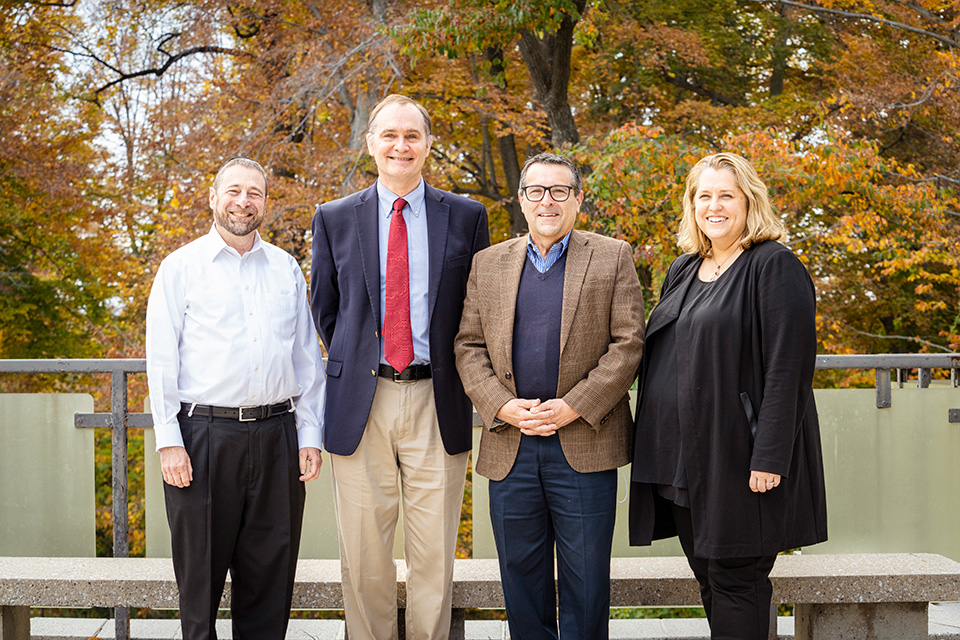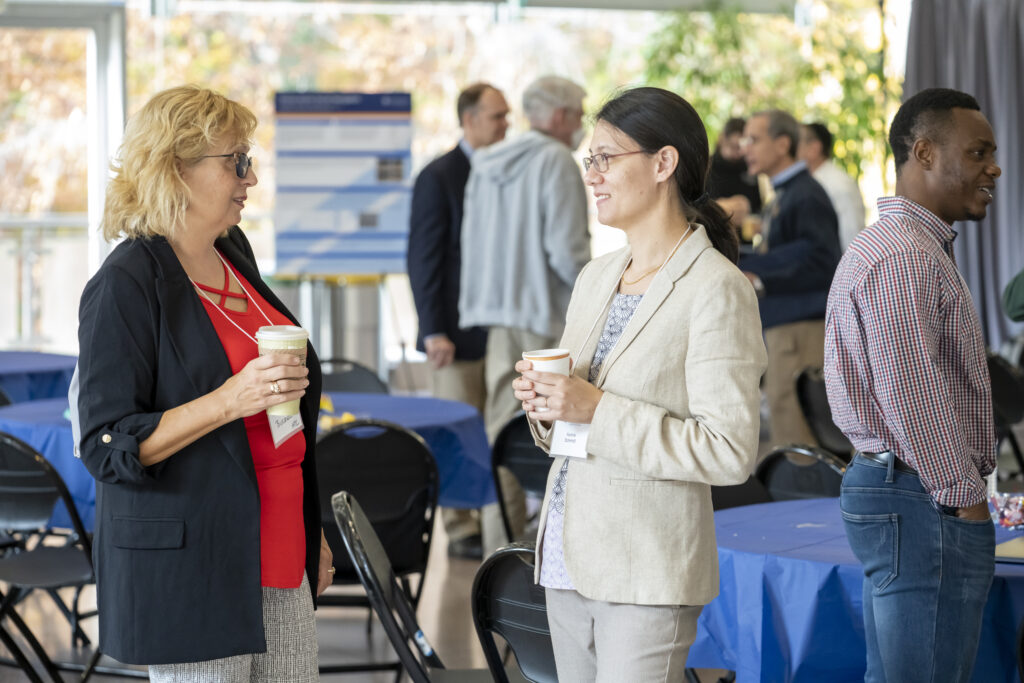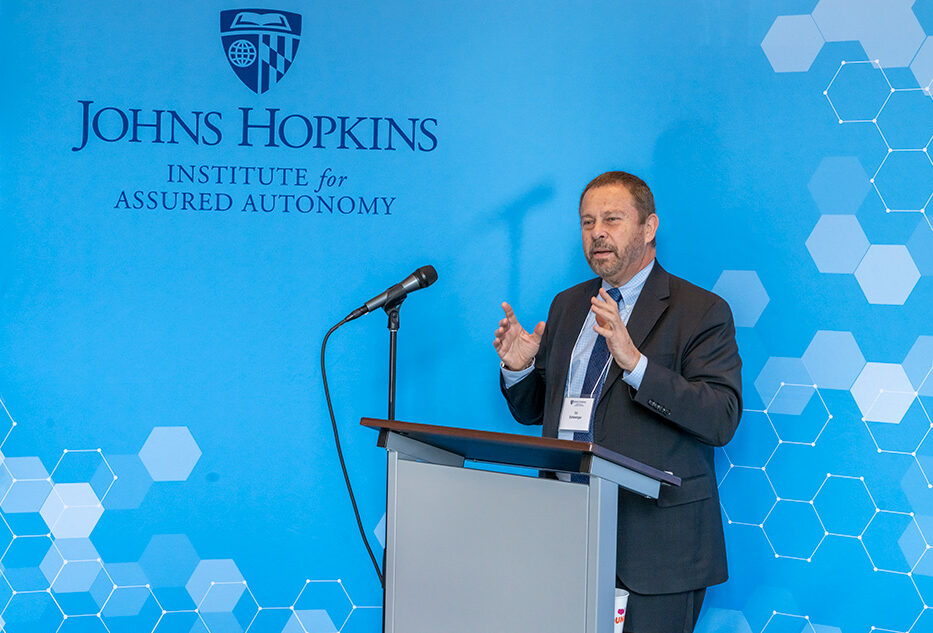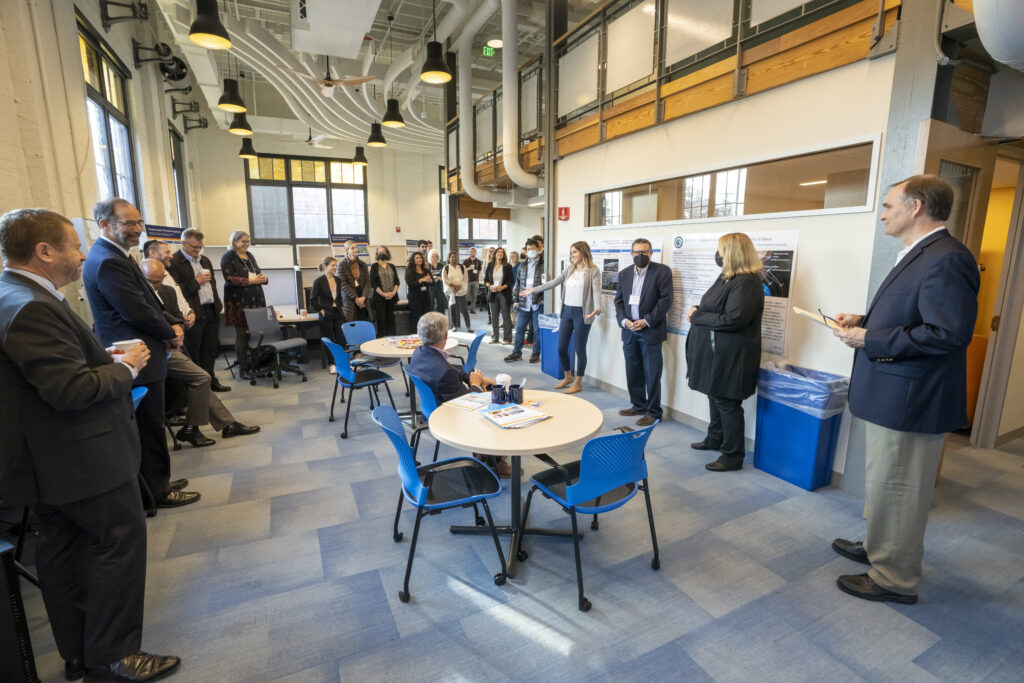In November, the Johns Hopkins Institute for Assured Autonomy (IAA) hosted its first research summit to bring researchers, industry professionals, and students together for a series of events that highlighted the importance of autonomy and assurance.
The summit featured keynote addresses, seminars and research presentations, and networking opportunities for attendees.
The three-day event began with an open house in IAA’s space in the historic Stieff Building in Baltimore. IAA Executive Director Jim Bellingham, and Co-Directors Cara LaPointe and Anton Dahbura talked about the institute’s role in the broader autonomy and assurance fields. Ed Schlesinger, Benjamin T. Rome Dean of the Whiting School of Engineering, delivered opening remarks about the importance of IAA’s mission and goals.

From left to right, David Silberberg, Jim Bellingham, Tony Dahbura, and Cara LaPointe.
After the open house, attendees headed to the JHU Homewood campus for a seminar by Alondra Nelson, deputy to the president and deputy director of the White House Office of Science and Technology Policy. Nelson discussed the Blueprint for an AI Bill of Rights that was released by the White House Office of Science and Technology Policy in October 2022. She also explained that complex problems require multidisciplinary perspectives and teams, and called the IAA community a broad mirror of her team at OSTP.
The final event on the first day was a research seminar by Cynthia Rudin, Earl D. McLean, Jr. Professor of computer science, electrical and computer engineering, statistical science, mathematics, biostatistics & bioinformatics at Duke University. During the seminar, Rudin discussed sparse model applications, including in healthcare and criminal justice.
The second day summit started with a career forum aimed at helping students learn about opportunities and paths in the field. Panelists included Jim Liew, founder of SoKat, and associate professor of finance in the JHU Carey Business School; Anqi Liu, assistant professor of computer science in the JHU Whiting School of Engineering; Aurora Schmidt, project manager in JHU/APL’s Research and Exploratory Development Mission Area; and Jonathan Wong, senior mechanical engineer at Oceaneering. Schmidt is a co-PI on the VALUES: Verified Assured Learning for Unmanned Embedding Systems project in IAA.

Two attendees connecting during the Wednesday afternoon session.
Two attendees connecting during the Wednesday afternoon session.To kick off the afternoon session, IAA welcomed Ralph Semmel, director of the Johns Hopkins Applied Physics Laboratory, who delivered opening remarks, and Bobby Braun, head of the Space Exploration Sector at APL, who gave a keynote address. Semmel discussed the history of APL and autonomy, and Braun talked about autonomy and assurance in space, including in the recent Double Asteroid Redirection Test (DART) mission that was conducted in late September 2022.
Representatives from each of the 10 seed projects that IAA funded initially presented updates about the status of their research and discussed future opportunities and next steps. The full session of research presentations is available on the IAA YouTube channel.
The research-focused day of the summit concluded with a networking reception for attendees to connect about possible future collaborations.
The final day of the IAA Research Summit started with nearly 20 virtual lightning talks on a range of topics connected to assurance and autonomy from experts around the world in the IAA community, including speakers from the FBI, University of York, Virginia Tech, and other organizations. Attendees were encouraged to connect directly with presenters to ask questions and explore possible collaboration opportunities.

Ed Schlesinger, Benjamin T. Rome Dean of the Whiting School of Engineering, delivering remarks during the open house event in the Stieff Building.
That afternoon, attendees visited APL for several talks and discussions, as well as opportunities for conversations. Jaret Riddick, the Department of Defense’s principal director for autonomy in the Office of the Undersecretary of Defense for Research and Engineering, delivered a keynote address, and discussed the DoD’s perspective on trusted autonomy, along with an overview of his existing work with IAA on establishing a DoD-wide, mission-focused roadmap for autonomy and advancing DoD strategy in robotic and autonomous systems.
Following Riddick’s remarks, Bellingham gave a short talk about the importance of the work being led by IAA, including achievements to date and the upcoming announcement of the next round of the IAA call for proposals. Bellingham, Dahbura, LaPointe, and David Silberberg, IAA research director, then participated in a panel discussion about the next phase of research that will be conducted in IAA. The IAA Research Summit concluded with a poster session celebrating the first round of research conducted in IAA and a reception for attendees.
The full recordings of several of the IAA Research Summit events are available on the IAA YouTube channel.
